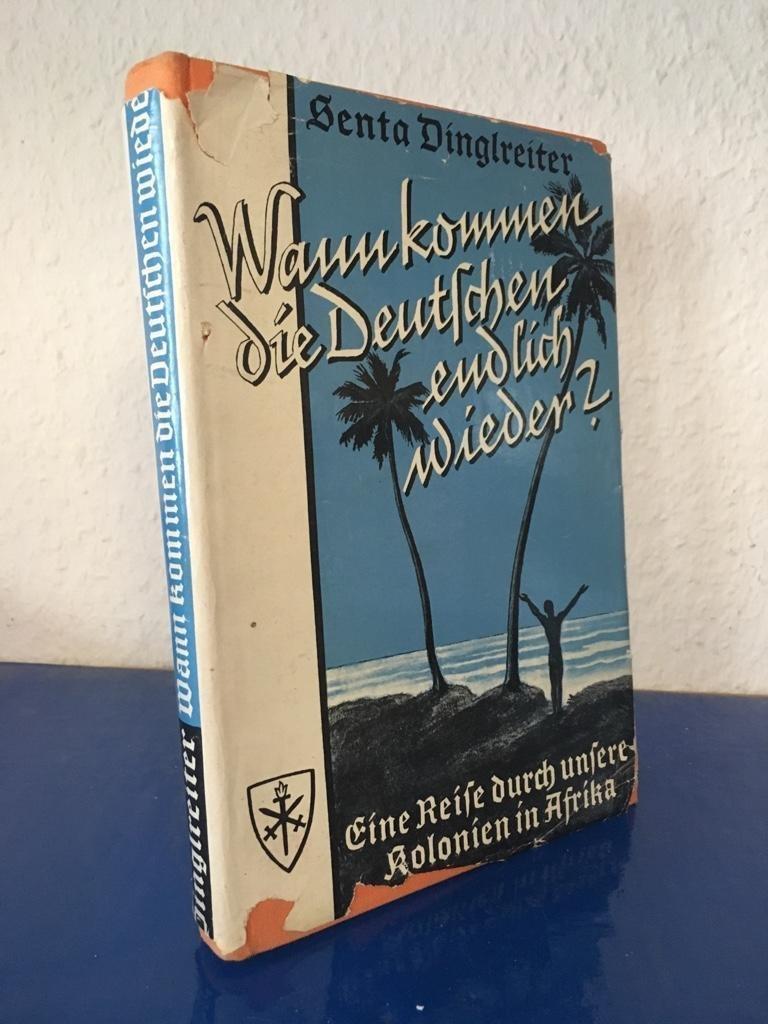
Wann kommen die Deutschen endlich wieder?
In the period between the World Wars, the German colonial elite underwent something of a transformation. What was at first a relatively apolitical appendage of the imperial government had, with the loss of Germany’s colonies as dictated by the Treaty of Versailles, become a mass movement focused on campaigning for the return of these colonies as well as raising awareness for a so called “colonial thinking”, which assumed colonialism was not only an economic necessity for Europe but also essential for Africa and Africans. A fairly large collection of primary literature ranging from academic publications to magazines and propaganda was created by German colonialists during the Interbellum wherein they justify their viewpoint by a variety of ways, many of which are available to research today at the university library in Frankfurt am Main. They also maintain a digital collection of around 50.000 images related to German colonialism which can be accessed through their website.
For this Critical Discourse Analysis, I want to focus on a work of popular literature that is part of this collection of colonialist thinking; Wann kommen die Deutschen endlich wieder? by the adventurer and novelist Senta Dinglreiter. Dinglreiter was born on a Lower Bavarian farm in 1893 and, despite many obstacles, managed to travel the world and write books about it. Wann kommen die Deutschen endlich wieder? was written by her in 1935 after she returned from a trip to all the former German colonies in Africa and Liberia. What makes this book particularly interesting is that the prevailing narrative that Dinglreiter presents is that Africans everywhere were clamouring for German rule to return, that she was greeted with waving black-white-red flags at the airport and many other examples that I will get into later. The title of the book is an expression of this sentiment as well;
"Ob man in Kamerun, in Togo, in Südwest, in Ostafrika reist, es ist immer dieselbe, sehnsüchtige Frage, die die Schwarzen stellen: "Wann endlich kommen die Deutschen wieder?" / Whether you travel in Cameroon,Togo, Southwest, East Africa, it's always the same, longing Question the black people ask: "When will the Germans finally come back?"
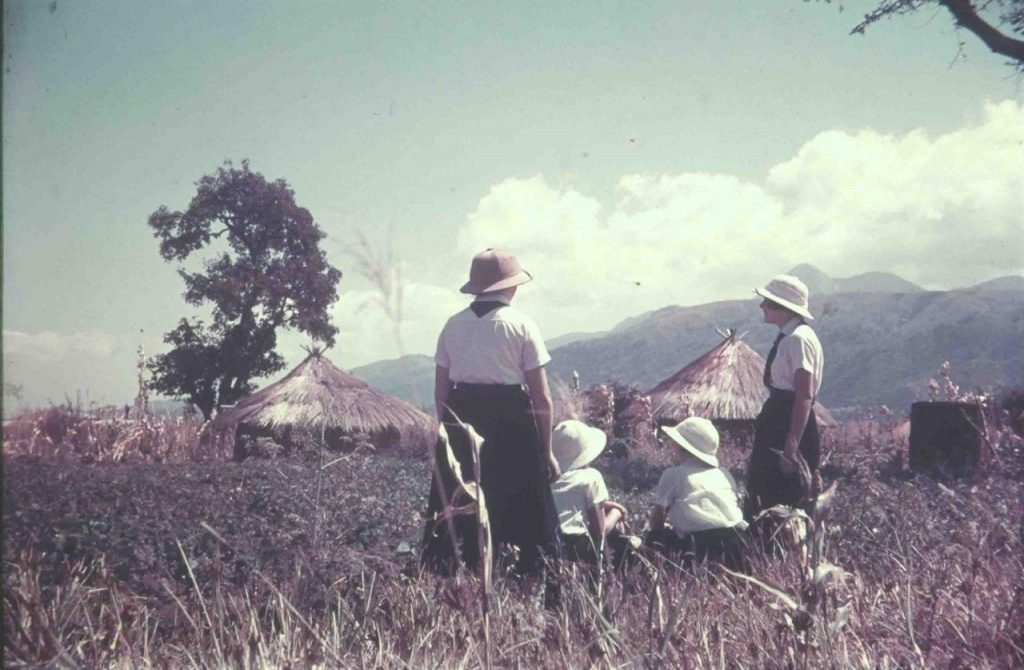
While of course a book designed to engender colonialist thinking written by a European for Europeans is at a serious disadvantage in the department of African representation, the presence of Africans in Dinglreiter’s narrative and their reported opinions on European rulership can teach us valuable lessons on how Germany wanted to be portrayed as in Africa and what this implies for them on the world stage. As I will soon illustrate with examples Dinglreiter often writes about African distaste for (newfound) British rule and this is the basis upon which German rule is then presented as an alternative, but occasionally disempowered African royalty is also expressing their preference for Germany over Britain. The latter case is particularly interesting because it demonstrates how the new balance of power affected certain African (intermediary) leaders in such a way that they would potentially end up siding with one European over another.
To keep this article at a digestible length I will look at excerpts from a select number of Dinglreiter’s book’s 18 chapters, a pdf file of a digitised copy of Wann kommen die Deutschen endlich wieder? in full is available here.
Foreword on the Treaty of Versailles
In the very first sentence of her book Dinglreiter repeats a sentiment seen often in German colonialist literature in this period;
“Deutschland hätte auf dem Gebiete der kolonialen Zivilisation vollkommen versagt - eine Anklage, von deren Unhaltbarkeit und Ungerechtigkeit heute die ganze zivilisierte Welt Kenntnis hat.” / Germany would have had completely failed in the field of colonial civilization - an accusation, the untenability and injustice of which today the whole civilized world has knowledge of.
Germany, with the Treaty of Versailles, was branded as an unfit coloniser by the Entente. It had therefore no right to maintain any colonies, which were overturned to more fitting Europeans, but only after a formal investigation into German conduct in Africa was completed by the American president Woodrow Wilson. Dinglreiter rails fervently against this investigation and the “blue book” that summarised its findings, calling it “A truly satanic work” based on false testimonies by Africans from the bush whose word was consistently taken as the truth over that of the German administrators. This is what drove Dinglreiter to visit Togo, Cameroon, Namibia and Tanzania via Liberia, Congo and Angola; to see for herself what the truth is. The idea of German colonial guilt- another recurring topic in colonialist literature called the Kolonialschuldlüge- is totally debunked, according to Dinglreiter, by Africans themselves.
“In allen Kolonien hallt der tausendfache, sehnsüchtige Schrei nach deutscher Herrschaft wider!” / In all colonies the thousandfold, longing cry for German rule echoes!
Even during the Great war, Africans stood and fought enthusiastically on the German side. They gave their property and blood, the Askaris and the tribes provided the Schutztruppen with food and provided the porters, because only with porters can weapons and food be transported in the bush and in the wilderness. In Tanganyika the majority of the African population were involved in the war and they maintained an enduring loyalty to Lettow-Vorbeck until the last.
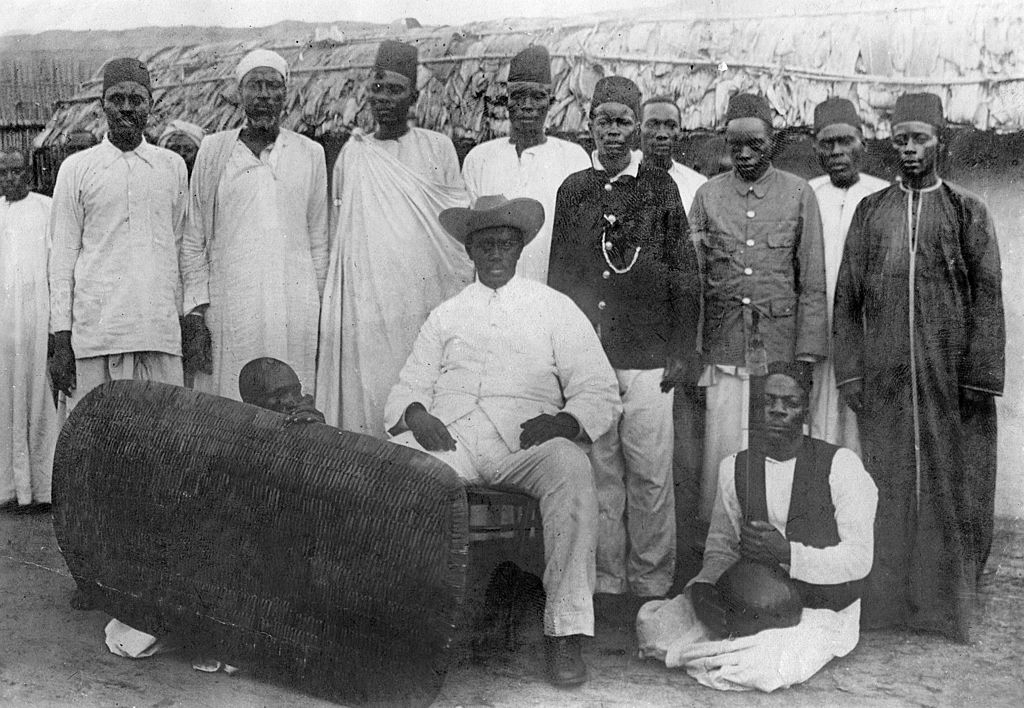
Sultan Kahigi and his entourage.
A sultan by the name of Kahigi lived in this colony, Dinglreiter writes. The black, white and red flag fluttered proudly over his hut - even after the British invaded. A group of English soldiers marched into his village and brought the order to remove the flag. Sultan Kahigi refused. He was then given the ultimatum to withdraw the flag within 24 hours. Only then did Kahigi relent. It was later discovered however that Kahigi had remained so loyal to Germany in the end that he chose to commit suicide over living in British occupied East Africa. Kahigi sent the German flag back to Germany through a runner as his last greeting. In Cameroon there was King Njoja. During the war he offered his help to the Germans and afterwards perished because of his loyal German attitude. In June of 1934, longing for the Germans to return, he died in French exile. These are the primary cases of unequivocal support Africans gave to Germany during and immediately after the war, notably two members of the nobility in their respective regions.
On the topic of resistance against German colonialism Dinglreiter writes that she only knows of one case, the Dualas tribe in Cameroon, who sold out and betrayed Germany during the war only to wish for their swift return after falling under French and British occupation. Cases of African resistance against these latter two colonisers in the mandate governments are more numerous, with an uprising having occurred in Togo as recently as February of the year of writing. Native Africans, “with whom the Germans never got into trouble”, were violently suppressed when they had looted French stores and hundreds of them were imprisoned. According to Dinglreiter the only shop that survived this event was the lone remaining German one. It seems that Africans in Togo and elsewhere in former German Africa experienced a similar kind of indignation to that of European Germans when the mandates were established.
“Honor his memory!” the Germanophile Africans
Upon her arrival in Togo Dinglreiter discovered that the French were very adverse against German journalists visiting the mandated colony, despite her only being there to do objective reporting by her own admission. She identified as many as four informants in her entourage that were there to pass off reports to the French authorities. One of these apparently kept baiting her into causing diplomatic incidents, such as when he took her to to three Africans who had written letters of grievances regarding their mistreatment by the French. When Dinglreiter accepted these letters and promised to take them back to Berlin, the informant told the French about it, which “in doing so turned the facts upside down”. In an aside within this chapter Dinglreiter thanks an Eduard Bohlen Mensah, a true Togolese son of Germany, who betrayed the French informant.
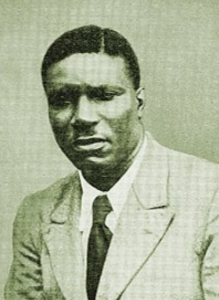
Eduard Bohlen Mensah.
In chapter six Dinglreiter returns to the subject of German war history in Cameroon, illustrated by her trip through the colony. Of note to her is king Njoja, who she describes as “an extremely intelligent person who devised his own script for his people, lived on the best of terms with the Germans and enjoyed the favor and friendship of the German emperor.” After the French mandate was established Njoja and the new administrators did not get along and Dinglreiter alleges that Njoja was slandered by the French governor, who then told him to return to and remain in Fumban, the capital city of his kingdom. As Njoja did not obey this demand, he was quickly deposed and banished to Yaounde. There he lived in exile, surrounded by his treasured gifts from the German emperor.
The last African king Dinglreiter mentions by name is the sultan Mussinga of Ruanda, which became a Belgian mandate. When the Belgians asked him to pledge allegiance to them, Mussinga wrote to the new administrators;
" - werde ich Deine Befehle befolgen, so lange Du keine feindlichen Handlungen gegen die Deutschen von mir verlangst, denn Du weißt, daß ich viele Jahre mit den Deutschen gut Freund war. Und wenn ich jetzt gegen meine Freunde übel handelte, könntest auch Du kein Vertrauen zu mir haben. Ich kann Dir auch keine Führer und keine Hilfskrieger stellen, denn ich bin ein Mann von Ehre." / "- I will obey your orders as long as you do not act hostile to them Demand Germans from me, because you know that I was good friends with the Germans for many years. And if I acted badly against my friends now, you could not have any trust in me either. I cannot provide you with leaders and auxiliary warriors either. because I am a man of honor. " -
A German missionary who stayed with Mussinga during the Great war was expelled by the Belgians and made to return to Berlin, which upset the sultan greatly. He told him: "Tell the German Kaiser and tell the German people, they shouldn't forget me!" which, much to Dinglreiter’s regret, did eventually happen. The noble people who stood with Germany in Africa were left by the wayside during the years of decline following the war. Like Njoja, Mussinga was eventually dethroned by the mandate government.
Lessons from German Africans in German Africa
The one sentence in Dinglreiter’s book that best exemplifies the point she is trying to get across is her citation of Cecil Rhodes, who stated that;
"Deutschland hat auf kolonialem Gebiet etwas geschaffen (in 30 Jahren! d. Verf.), wozu England 100 Jahre brauchen würde!" / "Germany has created something in colonial territory (in 30 years! By the author), for which England would take 100 years!"
When drawing conclusions from Wann kommen die Deutschen endlich wieder? it is important to keep in mind that Germany’s participation in colonialism began late, lasted a short time compared to other European powers in Africa and was constantly chasing after these other powers in terms of political prestige and a desire to “do things right”. The Great War left Germany without these prestige projects and led to an Entente- and League of Nations-led campaign of justifying their imperialism over that of the loser of the war, so the enthousiasm with which Germany had embarked upon its colonial mission was suddenly reversed into the same kind of embittered revanchism seen on the continent. The desire to prove France, Britain and America wrong manifested itself in a metaphysical sense through the colonialist movement that Dinglreiter was a part of, which, however limited, included “their” Africans as well. Kahigi, Njoja and Mussinga were the kind of African intermediary rulers other European powers interacted with before the Scramble, their dependence on and therefore their loyalty to their employer and vassal emperor should thus not come as too much of a surprise.
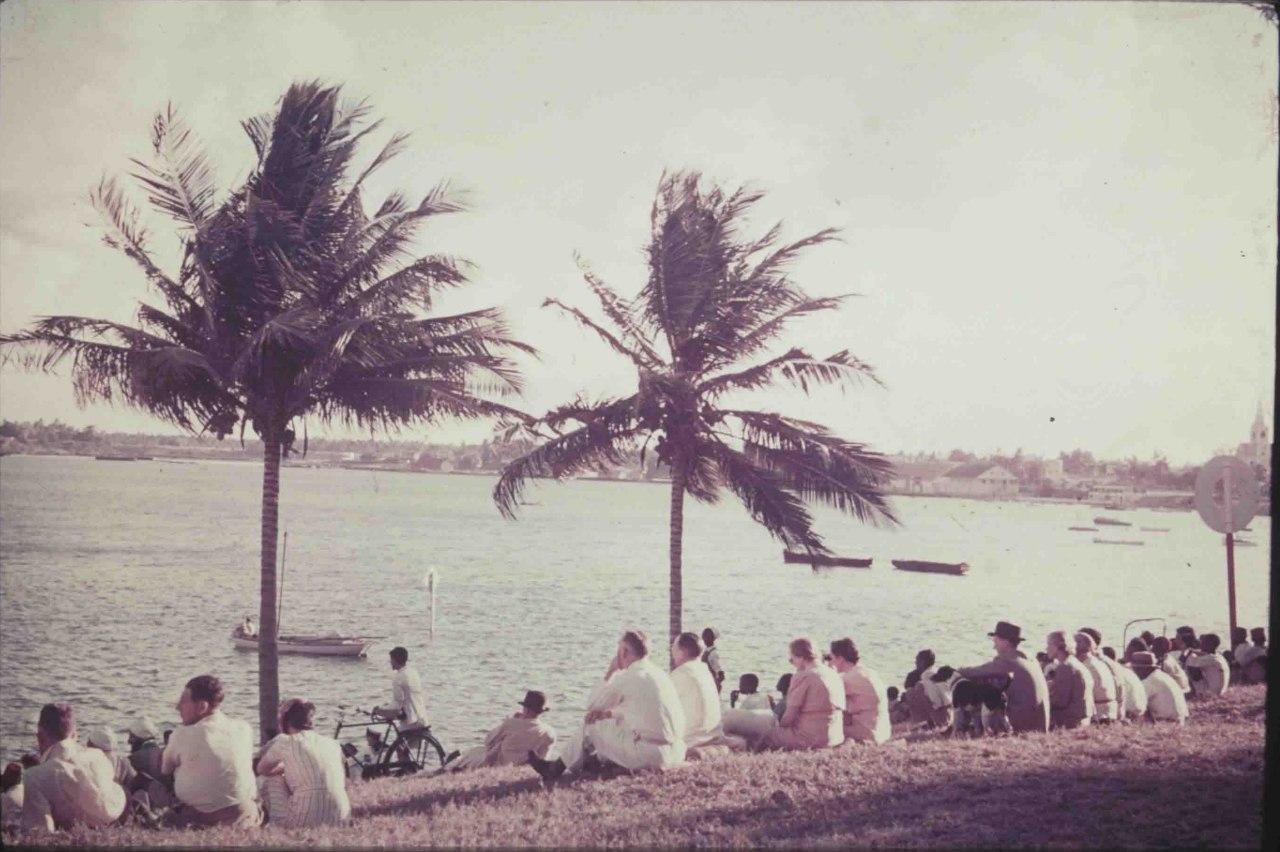
There is also a more practical aspect to consider. The “blue book” and the mandate governments caused a sudden shift in the power balance of Togo, Cameroon, Tanganyika and Namibia. This affected the three rulers Dinglreiter mentions the most, but also led to the disempowerment of Africans who traded with Germany or who were in the German colonial army to name a few examples. The revolt in Togo of February 1935 and the looting of French businesses while leaving the one German shop intact is one example of this. Those hundreds of Togolese that were imprisoned by the French might not have been ardent German monarchists in the way Dinglreiter suggests it for her metropolitan audience but might have simply been upset with the new status quo that favoured them less.
African involvement in colonialism is a subject often overlooked by non-historians and German colonialism in general tends to be seen as relatively insignificant in the grand scope of European rule over Africa, so examining figures like the three nobles from Dinglreiter’s book or even just the common man in the street left disaffected by the new administration can provide us with helpful insights in what colonialism meant to Africans and how they played a role in the interplay between their peoples and those of Europe.


Mirjam de Bruijn
October 7, 2020 (20:01)
Interesting reading of this period in parts of Africa, but also problematic. What to do with the ‘genocide on the herero’? it is also that you use the novel or ‘reportage’ as a historical source. Is the historical method also ‘close reading’? I think the use of language is worth analysing further.